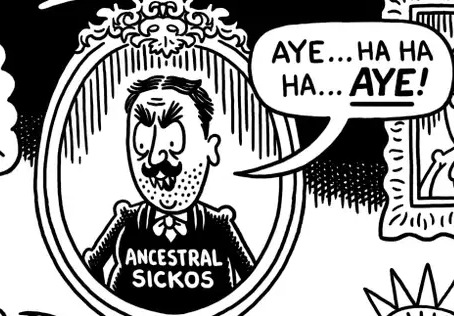- Selene (she/they) - major (as opposed to minor) - i post dumb stuff all the time - askbox and requests open - I follow from @seleneinadream - art tag is catgirl supreme - banner by Val @lavalender - my ko-fi is ko-fi.com/selenealwayscries
Last active 60 minutes ago
Don't wanna be here? Send us removal request.
Text
Gender essentialism is still cringe if it is directed against cis people btw. Ive basically had someone say to me that cis people are biologically incapable of understanding less normalized gender identities because "their brains work differently". If anyone has this opinion please come forward now so i can block you thank you. The reason cis people dont understand gender in the same way trans people do is because trans people are naturally more exposed to the discussion about gender because we have to think about it a lot. Cis people, who have never doubted their identity, obviously dont think about it as much, if at all.
Cis people arent inherently more stupid than us, or less capable of talking about gender on a biological level. What would that even look like???
13K notes
·
View notes
Note
Yeah, it definitely seems like that. And it's especially confusing (and also telling) because of the ongoing conversation about the violence Black men face at the hands of police. This isn't to say the police don't go after all Black people, of all genders, but the fact that people can reblog posts about how young Black boys with toy guns are for some reason perceived as a threat, but not make the connection that it's Black masculinity that is perceived as threatening or inherently violent (from childhood) is just...... "reading theory" should not just be a box someone checks, it needs to be applied to real life. Otherwise what's the point of reading it. But some people on here make it incredibly obvious their only intention with reading theory is to brag about their moral superiority and shame other people for not reading theory as well as them.
That's exactly it honestly — there's such a cognitive disconnect that has to happen to think that way.
Like — even if they're "reading theory" they're clearly not reading anything written by Black authors because Black activists, authors, etc. have been identifying that masculinity and masculinization are key components in racially motivated violence for decades.
Just to put his name on your example — Tamir Rice was a 12 year old child with a toy gun. He was killed by a white police officer because Black boys are adultified by under white supremacy by virtue of Black masculinity being treated as inherently violent, dangerous, and sexual.
Tamir Rice was murdered in 2014. He would have turned 23 years old this year. He should be graduating college. Instead he is dead.
The tangible real world consequence of the demonization of black masculinity is murder. I truly struggle to understand why some people cannot comprehend this.
136 notes
·
View notes
Text
I know a lot of the folks who follow me here are white. I know that statistically, white people are more likely to listen to other white people as voices of authority when it comes to race — especially if they do not know where to begin when it comes to anti-racist practices.
So, I'm gonna be brutally honest with you other white folks — You have to care about Black men. You have to care about Brown men. You have to care about Native and Indigenous men. You have to care about Asian men and that means all Asian men, not just East Asian men.
If you are white it is imperative to EVERY kind of anti-racist belief and action that you vocally care about men who are not white.
Lift up, support, and platform the voices of non-white women who are discussing misogyny in their communities, BUT — this is also imperative to remember — those conversations are not for you to add your voice to. Especially if you don't engage with non-white people, communities, or culture in literally any other context. It's straight up just not your space and that's okay. Sit with that. Please.
198 notes
·
View notes
Text

A couple of things here:
1) This 100% gives the game away that they do not give a fuck about biology like they pretend and that this entire trans panic is about punishing gender non-conformity. If you believed what makes a woman her inmate biology or whatever the fuck buzzwords they're using today, then how is this response not hypocritical?
2) She's being charged with a felony for putting a wad of gum on a car. $3,000 worth of property damage. We are throwing a woman's life away for $3,000 worth of property damage. It's fucking horrifying.
779 notes
·
View notes
Text
Delicate beautiful little baby bat necklace~ In stock now from The Gilded Witch 🦇


🖤 witchvamp.com 🖤
43 notes
·
View notes
Text
i kind of feel like if you take "don't bomb iran" as an endorsement of the iranian government, you're not intellectually ready to engage in conversations about real-world politics. Go talk about steven's universe instead
15K notes
·
View notes
Text
In general, understanding radical feminism for what it is and why it appeals to many people requires an understanding that the greatest strength of radical feminism as a tool for understanding misogyny and sexism is also its greatest faultline.
See, radical feminism is a second wave position in feminist thought and development. It is a reaction to what we sometimes call first wave feminism, which was so focused on specific legal freedoms that we usually refer to the activists who focused on it as suffragists or suffragettes: that is, first wave feminists were thinking about explicit laws that said "women cannot do this thing, and if they try, the law of the state and of other powerful institutions will forcibly evict them." Women of that era were very focused on explicit and obvious barriers to full participation in public and civil life, because there were a lot of them: you could not vote, you could not access education, you could not be trained in certain crucial professions, you could not earn your own pay even if you decided you wanted to.
And so these activists began to try to dig into the implicit beliefs and cultural structures that served to trap women asking designated paths, even if they did wish to do other things. Why is it that woman are pressured not to go into certain high prestige fields, even if in theory no one is stopping them? How do our ideas and attitudes about sex and gender create assumptions and patterns and constrictions that leave us trapped even when the explicit chains have been removed?
The second wave of feminism, then, is what happened when the daughters of this first wave--and their opponents--looked around and said to themselves: hold on, the explicit barriers are gone. The laws that treat us as a different and lesser class of people are gone. Why doesn't it feel like I have full access to freedoms that I see the men around me enjoying? What are the unspoken laws that keep us here?
And so these activists focused on the implicit ideas that create behavioral outcomes. They looked inward to interrogate both their own beliefs and the beliefs of other people around them. They discovered many things that were real and illuminated barriers that people hadn't thought of, especially around sexual violence and rape and trauma and harassment. In particular, these activists became known for exercises like consciousness-raising, in which everyday people were encouraged to sit down and consider the ways in which their own unspoken, implicit beliefs contributed to general societal problems of sexism and misogyny.
Introspection can be so intoxicating, though, because it allows us to place ourselves at the center of the social problems that we see around us. We are all naturally a little self centered, after all. When your work is so directly tied to digging up implications and resonances from unspoken beliefs, you start getting really into drawing lines of connection from your own point of interest to other related marginalizations--and for this generation of thinkers, often people who only experienced one major marginalization got the center of attention. Compounding this is the reality that it is easier to see the impacts of marginalization when they apply directly to you, and things that apply to you seem more important.
So some of this generation of thinkers thought to themselves, hang on. Hang on. Misogyny has its fingers in so many pies that we don't see, and I can see misogyny echoing through so many other marginalizations too--homophobia especially but also racism and ableism and classism. These echoes must be because there is one central oppression that underlies all the others, and while theoretically you could have a society with no class distinctions and no race distinctions, just biologically you always have sex and gender distinctions, right? So: perhaps misogyny is the original sin of culture, the well from which all the rest of it springs. Perhaps there's really no differences in gender, only in sex, and perhaps we can reach equality if only we can figure out how to eradicate gender entirely. Perhaps misogyny is the root from which all other oppressions stem: and this group of feminists called themselves radical feminists, after that root, because radix is the Latin word for root.
Very few of this generation of thinkers, you may be unsurprised to note, actually lived under a second marginalization that was not directly entangled with sexism and gender; queerness was pretty common, but queerness is also so very hard to distinguish from gender politics anyway. It's perhaps not surprising that at this time several Black women who were interested in gender oppression became openly annoyed and frustrated by the notion that if only we can fix gender oppression, we can fix everything: they understood racism much more clearly, they were used to considering and interrogating racism and thinking deeply about it, and they thought that collapsing racism into just a facet of misogyny cheapened both things and failed to let you understand either very well. These thinkers said: no, actually, there isn't one original sin that corrupted us all, there are a host of sins humans are prone to, and hey, isn't the concept of original sin just a little bit Christianocentric anyway?
And from these thinkers we see intersectional feminists appearing. These are the third wave, and from this point much mainstream feminist throughout moves to asking: okay, so how do the intersections of misogyny make it appear differently in all these different marginalized contexts? What does misogyny do in response to racial oppression? What does it look like against this background, or that one?
But the radical feminists remained, because seeing your own problems and your own thought processes as the center of the entire world and the answer to the entire problem of justice is very seductive indeed. And they felt left behind and got quite angry about this, and cast about for ways to feel relevant without having to decenter themselves. And, well, trans women were right there, and they made such a convenient target...
That's what a TERF is.
Now you know.
8K notes
·
View notes















